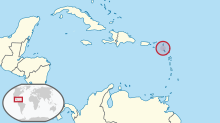LGBTQ rights in Sint Eustatius
LGBTQ rights in Sint Eustatius | |
|---|---|
 | |
| Status | Legal |
| Military | LGBT people allowed to serve openly |
| Discrimination protections | Discrimination based on "heterosexual and homosexual orientation" prohibited |
| Family rights | |
| Recognition of relationships | Same-sex marriage since 2012 |
| Adoption | Full adoption rights since 2012 |
Lesbian, gay, bisexual, and transgender (LGBT) rights in Sint Eustatius are quite progressive by Caribbean standards. Sint Eustatius forms part of the Caribbean Netherlands and is a special municipality of the Netherlands. Both male and female same-sex sexual activity are legal in Sint Eustatius, with same-sex marriage, registered partnership, and adoption being legal since 2012. In addition, discrimination on the basis of "heterosexual and homosexual orientation" is outlawed.
Law regarding same-sex sexual activity
[edit]Same-sex sexual activity is legal in Sint Eustatius.[1]
Recognition of same-sex relationships
[edit]Same-sex marriage in Sint Eustatius became legal following the entry into force of a law enabling same-sex couples to marry there on 10 October 2012.[2][3]
The issue of same-sex marriage caused considerable controversy in Sint Eustatius. In 2010, the Island Council expressed unanimous opposition to the extension of same-sex marriage to Sint Eustatius.[4] The same-sex marriage law being passed by the Dutch House of Representatives led to calls of "neo-colonialism".
Discrimination protections
[edit]The Criminal Code BES (Dutch: Wetboek van Strafrecht BES), which applies to Sint Eustatius and the islands of Bonaire and Saba, criminalizes discrimination on the basis of "heterosexual and homosexual orientation". Article 144 provides for penalties varying from fines to two years' imprisonment.[5]
In addition, Article 1 of the Constitution of the Netherlands applies to Sint Eustatius. The article reads "All persons in the Netherlands shall be treated equally in equal circumstances. Discrimination on the grounds of religion, belief, political opinion, race or sex or on any other grounds whatsoever shall not be permitted."[6][7]
The Netherlands Institute for Human Rights (College voor de Rechten van de Mens) is a research institute which "protects, advances and monitors human rights". The Institute, established by law in 2010, works in the European Netherlands and also in the Caribbean Netherlands.[7][8]
Living conditions
[edit]Due to Sint Eustatius' very small population, there is no gay scene on the island, nor any specific gay bars or venues.[9] A majority of St. Eustatians affiliate with Christian churches, with Methodism and Roman Catholicism being the two largest denominations. As such, societal perceptions of LGBT people tend to reflect Christian mores, and gay and lesbian locals "tend to keep a low profile".
Summary table
[edit]| Same-sex sexual activity legal | |
| Equal age of consent | |
| Anti-discrimination laws in employment | |
| Anti-discrimination laws in the provision of goods and services | |
| Anti-discrimination laws in all other areas | |
| Same-sex marriages | |
| Recognition of same-sex relationships | |
| Stepchild adoption by same-sex couples | |
| Joint adoption by same-sex couples | |
| LGBT people allowed to serve in the military | |
| Right to change legal gender | |
| Access to IVF for lesbian couples | |
| Commercial surrogacy for gay male couples | |
| MSMs allowed to donate blood |
See also
[edit]- LGBT rights in the Netherlands
- LGBT rights in the Americas
- LGBT rights in Bonaire
- LGBT rights in Saba
- Same-sex marriage in Bonaire, Sint Eustatius and Saba
References
[edit]- ^ State-sponsored Homophobia A world survey of laws prohibiting same sex activity between consenting adults Archived 17 October 2012 at the Wayback Machine
- ^ "Burgerlijk wetboek BES, boek 1" (in Dutch). Government of the Netherlands. Archived from the original on 4 April 2016. Retrieved 12 October 2012.
- ^ "Aanpassingswet openbare lichamen Bonaire, Sint Eustatius en Saba" (in Dutch). Government of the Netherlands. 1 September 2010. Archived from the original on 6 March 2016. Retrieved 4 April 2016.
- ^ "Sint Eustatius verzet zich tegen homohuwelijk". Volkskrant (in Dutch). 21 April 2010.
- ^ "Wetboek van Strafrecht BES". wetten.nl (in Dutch). 30 August 2010.
- ^ "The Constitution of the Kingdom of the Netherlands 2008". Government of the Netherlands. 18 October 2012.
- ^ a b "Oprichting van het College voor de rechten van de mens (Wet College voor de rechten van de mens)". overheid.nl (in Dutch). 2010.
- ^ "Mission and ambition". College voor de Rechten van de Mens.
- ^ Richard Ammon (September 2012). "Gay Life in Sint Eustatius". Globalgayz.
- ^ Chiam, Zhan; Duffy, Sandra; González Gil, Matilda; Goodwin, Lara; Timothy Mpemba Patel, Nigel. "Trans Legal Mapping Report 2019: Recognition before the law" (PDF). ILGA World. Retrieved 2024-11-20.
